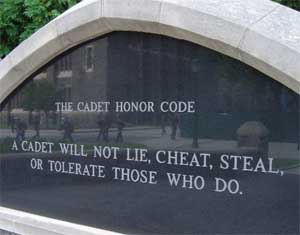By Carmen Villani
Honor does not see color of skin. Honor does not see gender. Honor does not see socioeconomic status. What it does see is the “dream” of Dr. Martin Luther King, Jr. — judging a person based upon content of his or her character.
Honor is not a casual word that is tossed around and then largely ignored at the Virginia Military Institute. It is the essence and foundation of the VMI Experience. This system is predicated upon character and starts with the Honor Code — a cadet will not lie, cheat, or steal, nor tolerate those that do. That code is not “suspended,” waived by granting “amnesty,” or compromised by circumstance. It is the moral compass for those who currently wear the VMI uniform and those who have. It is fiercely guarded by the Corps of Cadets and alumni alike. Violation of the Honor Code is not an option if a cadet expects to graduate from VMI.
With the Honor Code at its core, the Honor System then turns to education, embracement, and enforcement. Education begins with the Honor Court president speaking to the new cadets highlighting the Code itself, the importance of it during their cadetship, and the serious consequences should a cadet not abide by it. A guideline is posted in every cadet’s room to serve as an overview of the Honor System, reflecting its importance in everyday cadet life. Time is then spent with Honor Court representatives in the first couple of weeks of their cadetship learning the Honor System in greater detail and addressing any questions or concerns. There is also a mentoring system in which each cadet is paired up with a First Classman (senior) thereby providing another avenue from which to learn and ask questions.
Once introduced to the Honor System, new cadets quickly learn that the Upperclassmen embrace this system. They come to realize that it produces an environment where their word is not questioned by fellow cadets or their professors. Locks on doors in barracks are not required. Possessions accidentally left someplace will be there upon the cadet’s return.
The Corps of Cadets entrust the solemn responsibility of ensuring the integrity of the Honor System to the Honor Court. The Honor Court is comprised of members from the Corps. Cases are brought to trial predicated upon two criteria. The first: did the cadet commit an honor violation? The second: does the evidence prove beyond a reasonable doubt that he/she is guilty?
Articles in the media have suggested that skin color is a factor. (See “VMI, under fire for expelling Black cadets, considers changes to Honor Court system” in The Washington Post). I would strenuously disagree with such an assertion. Investigations are painstakingly thorough, and a member of the faculty provides oversight to ensure the integrity of the investigation. The cadet is provided ample opportunity to defend himself/herself before the Honor Court and an appeal process is provided should the cadet believe the verdict rendered is incorrect. The secrecy of investigations and trials allows a cadet to return to the Corps without prejudice if found innocent.
As has been stated by others, there are no degrees of honor at VMI and as such, there can be only one penalty in the event a guilty verdict is rendered and that is dismissal. The drumout is a clear message to the Corps that the Honor Code is being enforced and that Honor Court has carried out its responsibility entrusted to them.
In a letter dated October 19, 2020, the Governor’s Office referred to the “appalling culture of ongoing structural racism at the Virginia Military Institute.” Such a description is troubling given that the Governor himself is a VMI graduate and, like myself, a former president of the Honor Court. To make such serious allegations without a proper investigation runs counter to the way the investigative process is done with the Honor System at VMI. Additionally, State Senator Janet Howell, D-Fairfax, needs to rethink her comment about the “importance” or “relevancy” of VMI. Now more than ever, our nation needs the steadfast values of honor, principled leadership, and accountability that VMI strives to achieve each and every day.
In closing, our nation’s first President, George Washington, said: “Still I hope I shall possess firmness and virtue enough to maintain what I consider the most enviable of all titles, the character of an honest man.” Nearly two centuries later, Dr. Martin Luther King Jr. spoke of a “dream” whereby we as a society “judge by content of character,” not “color of skin.” We at the Virginia Military Institute strive for and have achieved both with great success!
Carmen Villani, Virginia Military Institute class of 1976, is a former president of the Honor Court.



